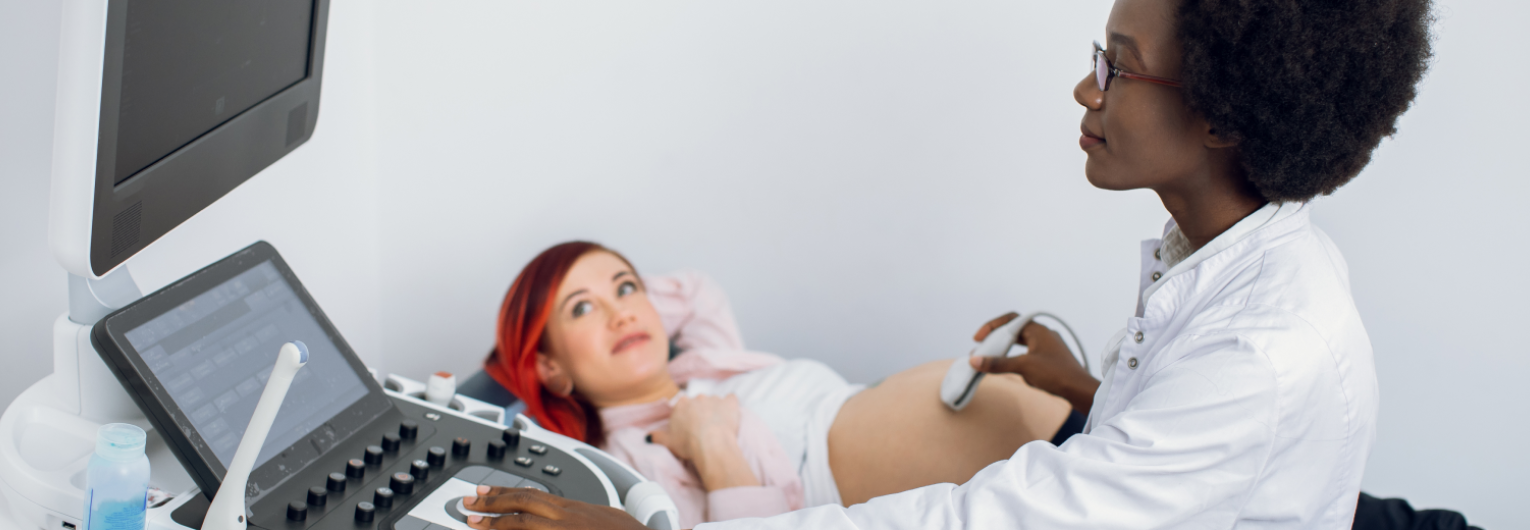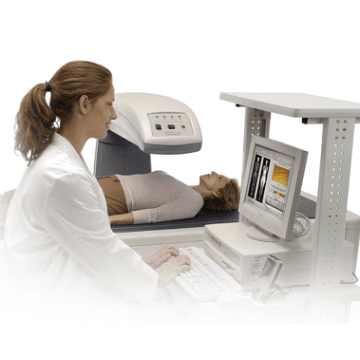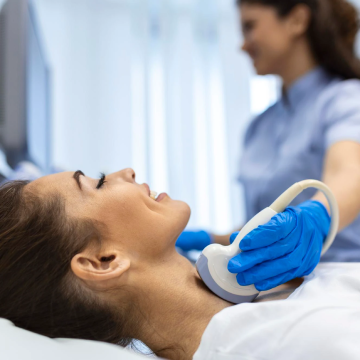
Diagnostic Imaging Tests
Book an appointment at:
Our imaging facilities offer easy access, flexible appointment scheduling, fully digital technology and a welcoming and comfortable atmosphere. We look forward to serving you.
Bone Mineral Density (BMD)
The goal of BMD studies is to accurately and reproducibly measure your bone mineral density and compare the measurement to reference population standards. This comparison contributes to your referring physician’s diagnosis of osteoporosis in symptomatic people, assessment of risk of sustaining fracture, and the possible need for appropriate therapy and fracture prevention programs. It is also useful in evaluating the effectiveness of prior or current therapy.

General Radiography (X-ray)
Conventional radiology is a simple, painless procedure that enables the radiologist to analyze the bone and soft tissue anatomy for diagnosis. X-rays or radiographs use a form of ionizing electromagnetic radiation to detect abnormalities in all different parts of the body.

Ultrasound
Ultrasound, (also referred to as sonography), is an imaging technique that generates high resolution images of internal organs, vessels and tissues in the body using high frequency sound waves that bounce off internal tissues and produce echoes.
- These echo patterns produce images of the body tissue being examined. Sound waves are sent and received through a small hand held device known as a transducer.
- The returning sound waves are used to produce the images.
- Special computer equipment is used to convert these echoes into visual data.
- Since ultrasound images are captured real time, they can show movement of internal organs and tissues and enable physicians to see blood flow.

Booking an appointment
All Ultrasound exams & BMD require an appointment X-ray are walk-in. You must have a referral form (requisition) signed by your doctor for the exam. Please bring this requisition with you to your appointment. To avoid any misunderstanding please let our staff know which exams have been requested by your doctor when calling for an appointment.
- You will be asked to present your Health Card at each visit, so please bring it with you.
- Wait times and exam times may vary.
- Please telephone within 24-48 hours prior to your appointment if you need to cancel or reschedule your appointment.
- If you arrive late for your appointment, or if you are not fully prepared, your examination may have to be delayed or rescheduled. Please follow preparation instructions accordingly as if you are not fully prepared, your examination may have to be delayed or rescheduled.

Ultrasound and Bone Mineral Density exams generally require an appointment. (Occasionally, subject to availability, bone mineral density and some ultrasound exams may be accommodated on a walk-in basis, however availability on a walk in basis cannot be guaranteed.
Please call (416) 510-9977 (Don Mills) or (416) 321-2670 (Lawrence) in advance to confirm availability).

X-ray exams do not require an appointment as patients are seen on a first come first served basis.
Note: You may book an appointment for your exam in person or by phone (416) 510-9977
General guidelines for the day of your exam
Preparation depends on the type of exam requested by your physician. Listed below are the exam preparations.
Please remove all body piercing
prior to appointment
If you are taking a prescribed medication,
please take it with some water.
Please follow preparation instructions accordingly. If you are not fully prepared, your examination may have to be be delayed or rescheduled. If you have any special needs such as physical limitations, please call ahead to advise our staff.
- Notify our technologist prior to the exam if you are or may be pregnant
- Arrive 10-15 minutes before your scheduled exam unless otherwise notified. This will allow time for registration and completion of any required paperwork. If you are late for your appointment you may be required to wait, or your exam may have to be rescheduled.
- Bring the completed requisition signed by your doctor with you on the day of your exam.
- Bring your health insurance card with you as you will be asked to present it at the time of your exam.
- If you have any prior X-rays or scans with you that may be pertinent to the requested exam please bring them with you as these may be helpful to the radiologists.
- Take all prescribed medications as directed by your physician.
- Wear loose, comfortable, metal/plastic free, clothing. Avoid wearing jewelry.
- Be prepared to change into a patient gown if necessary.
- For Bone Mineral Density (BMD) exams you will be asked to complete a BMD questionnaire at the time of your appointment.
Abdominal Ultrasound
30-40 minutes
Kidneys, Gall bladder, Liver, Spleen, Pancreas
AM exam: Avoid fatty dinner. Nothing to eat or drink from midnight the night before (8 hours fasting). Small quantities of clear fluids are permitted. Any medication should be taken as required.
PM exam: For breakfast you may drink, black tea or coffee (NO MILK OR SUGAR) up to 9 am. Fasting the rest of the day.
Abdominal & Pelvic Combined/ Urinary Tract Ultrasound
30-40 minutes
Avoid fatty dinner. Nothing to eat for 8 hours before the exam. Small quantities of clear fluid are permitted.
Finish drinking 4 cups or 1 L (2bottles) of water one hour prior to the exam. DO NOT EMPTY BLADDER.
Abdominal Ultrasound
30-40 minutes
Finish drinking 4 cups or 1 L (2bottles) of water one hour prior to the exam. DO NOT EMPTY BLADDER.
Note: If you are booking a “transvaginal” examination, please let us know when booking appointment.
Breast Ultrasound
30-45 minutes
No special preparation.
Ultrasound of Scrotum, Thyroid, Breast & Musculskeletal
30-60 minutes
No special preparation
Bone Mineral Density
15-20 minutes
Calcium, Vitamin D and Multi Vitamins must be stopped 48 hours prior to appointment. No Barium or IV Contrast studies with in 10 days.
Find a Location
Ajax - Bayly
Saturday: 9:00 am - 12:00 noon
Closed Sundays and Statutory Holidays
Cambridge
Closed Saturday, Sundays and Statutory Holidays
Collingwood - Huron Street
Closed Saturdays, Sundays and Statutory Holidays
Ellesmere
Sat: 9am - 1pm
Closed Sundays and Statutory Holidays
Erin - Thompson Crescent
Saturday: 8:00 am - 12:30 pm
Closed Sundays and Statutory Holidays
London - Barker Street
Closed Saturday, Sundays and Statutory Holidays
London - Gainsborough Road
Closed Saturday, Sundays and Statutory Holidays
London - Oxford Street
Closed Saturdays, Sundays and Statutory Holidays
London - Southdale Road
Closed Sundays and Statutory Holidays
London - Wortley Road
Markham - Yonge Street
LUNCH: 1:00 pm - 2:00 pm
Saturday: 8:30 am - 1:00 pm
Closed Sundays and Statutory Holidays
Mississauga - Derry Road
Saturday: 9:00 am - 1:00 pm
Closed Sundays and Statutory Holidays
Mississauga - Goreway Drive
Saturday: 9:30 am - 1:00 pm
Closed Sundays and Statutory Holidays
Orillia - Memorial Avenue
Closed Saturdays, Sundays and Statutory Holidays
Platinum
Sat: 9am - 12pm
Closed Sundays and Statutory Holidays
Stayner
Closed Saturday, Sundays and Statutory Holidays
Stratford - Douro Street
Closed Saturdays, Sundays and Statutory Holidays
Toronto - Broadview Avenue
Saturday: 7:30 am - 1:00 pm
Closed Sundays and Statutory Holidays
Toronto - College Street
LUNCH: 1:00 pm - 2:00 pm
Saturday:9:00 am - 12:00 noon
Closed Sundays and Statutory Holidays
Toronto - Dixon Road
Saturday: 7:30 am - 1:00 pm
Closed Sundays and Statutory Holidays
Toronto - Don Mills Road
Saturday: 9:00 am - 1:00 pm
Closed Sundays and Statutory Holidays
Toronto - Finch Avenue East
Saturday: 8:00 am - 1:00 pm
Closed Sundays and Statutory Holidays
Toronto - Keele Street
Friday: 7:30 am - 4:30 pm
Saturday: 8:00 am - 12:00 pm
Closed Sundays and Statutory Holidays
Toronto - Kipling Avenue
Saturday: 8:30 am - 11:30 am
Closed Sundays and Statutory Holidays
Toronto - Lawrence Avenue East
Sat: 8:00 am - 1:00 pm
Diagnostic
Mon - Fri: 9:00am - 5:00pm
Sat: 9:00 am - 1:00pm
Closed Sundays and Statutory Holidays
Toronto - Midland Avenue
LUNCH: 1:00 pm - 1:30 pm
Saturday: 8:30 am - 12:30 pm
Closed Sundays and Statutory Holidays
Toronto - Overlea Boulevard
Saturday: 7:30 am - 12:30 pm
Closed Sundays and Statutory Holidays
Toronto - Pape Avenue
Saturday: 8:30 am - 12:30 pm
Closed Sundays and Statutory Holidays
Toronto - St. Clair West
Friday: 8:00 am - 3:00 pm
Saturday: 8:00 am - 12:00 pm
Closed Sundays and Statutory Holidays
Uxbridge - Campbell Drive
Friday 9am to 1pm
Saturday 9am to 12pm
Closed Sundays and Statutory Holidays
Vaughan - McNaughton Road
Sat: 9:00 am - 1:00 pm
Closed Sundays and Statutory Holidays
Vaughan - Rutherford Road
Saturday: 8:00 am - 1:00 pm
Closed Sundays and Statutory Holidays
Waterdown - Dundas Street East
Wednesday: 8:00 am - 1:00 pm
Friday: 8:00 am - 5:00 pm
Closed Sundays and Statutory Holidays
Welland - Prince Charles Drive
Closed Saturdays, Sundays and Statutory Holidays
Whitby - Anderson Street
Closed Sundays and Statutory Holidays
